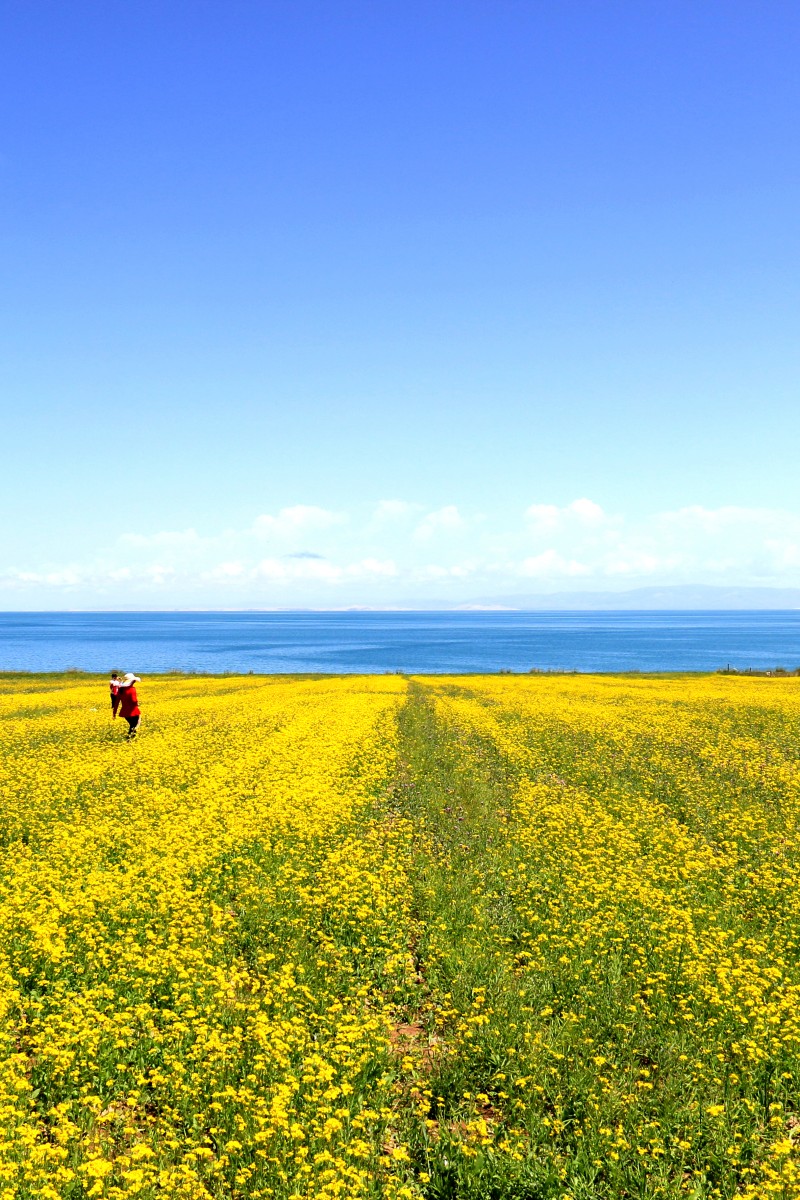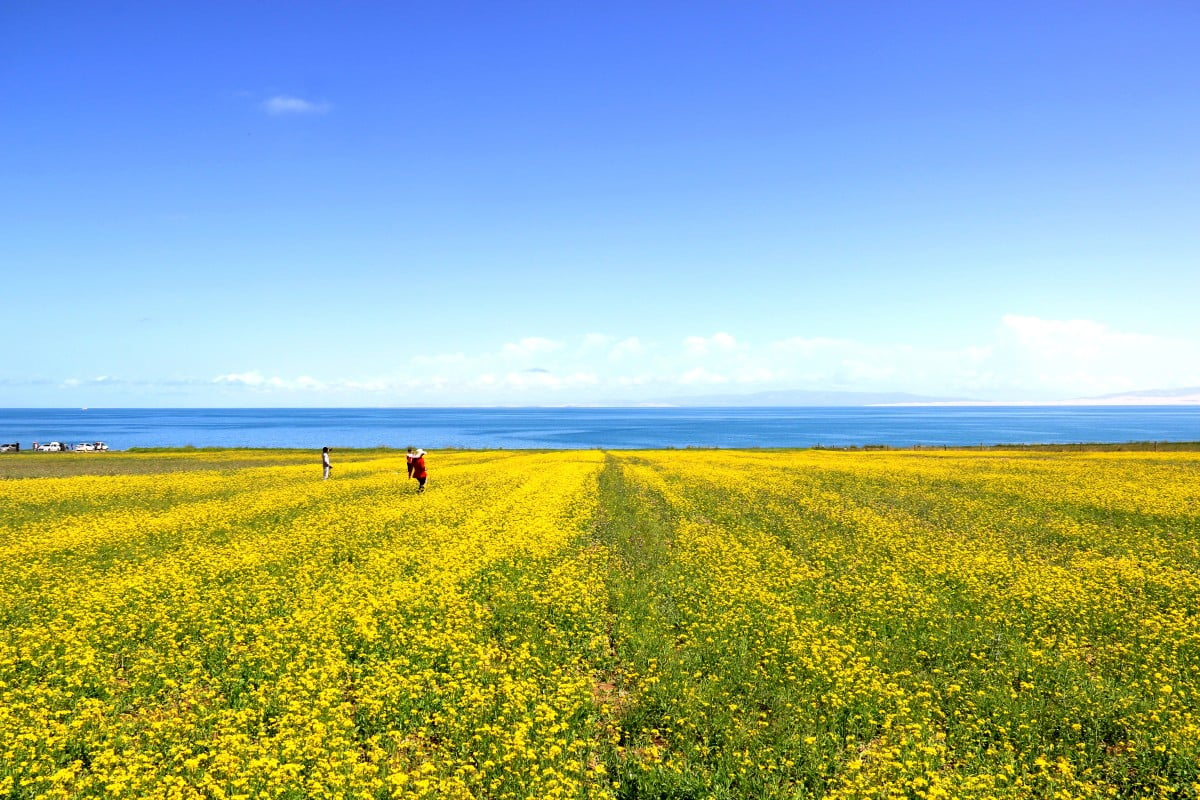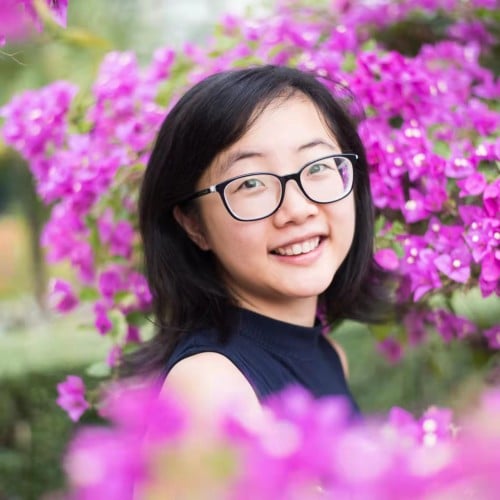
Check in China: How to enjoy the natural wonders and history of Qinghai, the north-western province with a taste of Tibet
From a teal blue lake to bright yellow fields of flowers, Qinghai has many sights to behold, and is rich in traditional Tibetan culture
 Qinghai Lake is the largest inland lake in China.
Qinghai Lake is the largest inland lake in China.The province of Qinghai – which literally translates to “teal sea” – in the north-west of the mainland is widely known for the magnificent Qinghai Lake and its seas of blooming rape flowers in summer – but it has a lot more to offer.
The province, which neighbours Tibet, sits on the Qinghai-Tibet Plateau and is heavily influenced by Tibetan and Mongolian culture.
Qinghai lake
Many people visit Qinghai just to see the lake – the largest inland and saltwater lake in China. Local people call the lake a “sea” as it seems as deep and as vast as one.
Check in China: Travel to scenic Yangshuo county for a relaxing holiday with sun and sports
Even in the height of summer, the average daytime temperature is often less than 20 degrees Celsius. Fans, let alone air conditioners, are not common in Qinghai homes.
July is the perfect time to see the well-known rape flowers go into full bloom. Make sure you have plenty of space on your phone for photos, as the fields of flowers go on as far as the eye can see.
July is also the right month to catch the Tour of Qinghai Lake – an annual professional bicycle race. Cycling is not just for professionals, though, as it’s the perfect mode transport for touring the lake. Tourists can often be spotted riding a bike and hopping from one hostel to another.
Bikes are not the only things you can ride. Local herdsmen often make extra cash by letting tourists ride a yak, sometimes in traditional costumes. Other popular activities include strolling on the grass, sandboarding, and horse-riding.
Kumbum monastery
The monastery, which is a Tibetan gompa (a building that is a cross between a fortress, a university, and a monastery) and is also known as the Ta’er Temple, is close to Xining.
The temple has a history that dates back more than 400 years, and it is home to more than 400 monks. It is also a great place to go if you want to learn about the Tibetan religious culture, architecture, and art. Note: you are not allowed to take photos inside the temple halls.
Check in China: The ultimate guide to the sights and adventures of Dunhuang
Flower scenic spot
While rape flowers can be seen almost everywhere, the best views (and therefore the most ‘Grammable shots) can be found in Menyuan. The flower field, which is close to the Qilian Mountains, looks like a golden basin surrounded by an endless backdrop of rivers and mountains, which are often topped with snow even in summer.
Every July, the people of Menyuan hold a rape flower cultural tourism festival, where you will get to go appreciate flowers, taste local food, and do a little bit of shopping.
Qilian mountains
These mountains form a border between Qinghai and the Gansu province. Look out for the ice glaciers: it’s a spectacular sight that has been formed by the snow that accumulates here.
In the summer months, the mountain slopes are fully covered by lush grasslands and wildflowers, and herds of animals roam the valleys. The area is often known to locals as the “little Switzerland in the East” because the landscape looks a lot like what people think Switzerland looks like. Qilian is also known as “heavenly mountain” in ancient Hun language (the language of Xiongnu people).
There is something new to discover at practically every turn in the roads that wind around the mountains, which makes this place another ideal spot for snapping photos.
Travel the world, it can change your outlook!
How to get there
Flights to Qinghai land in the provincial capital of Xining. There are tour buses that go to various tourist destinations, but we think you would be better off joining a local tour, or renting a car if you’re with someone who can drive.
If you’re doing the latter, make sure to drive safely – look out for the yaks and sheep that travel the roads as well. If you’re coming in (or heading out to) Tibet too, please note that Xining is also connected to Lhasa, Tibet via the Qinghai-Tibet railway or Qingzang railway.
Before you go
- Wear sunscreen and sunglasses – just because it doesn’t feel hot doesn’t mean you shouldn’t take precautions.
- It’s not just the sun that might make you ill – altitude sickness is a very real danger, too. If you’re going any higher than 3,000km above sea level, drink plenty of water, rest often, and rest if you feel unwell.
- Bring a jacket to put on after the sun goes down – it gets cold at night in the mountains.
- Keep a small amount of cash on you. You might want need to tip the locals in exchange for allowing you into the flower fields.
- Xining is home to the only two five-star hotels in the province. Outside the city, the accommodation is not going to be as fancy. This might not be a bad thing – you might get to sleep in a ger (a traditional tent) just like nomads do!
